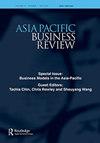Effects of talent status and leader-member exchange on innovative work behaviour in talent management in Japan
IF 2
4区 管理学
Q3 BUSINESS
引用次数: 0
Abstract
ABSTRACT This study examined the effects of talent status (TS) on innovative work behaviour (IWB) and the moderating effects of leader-member relationship quality (LMX) on the relationship between TS and IWB among white-collar workers in Japanese firms. We analysed data from 876 participants. The results indicate that LMX positively affects IWB in the relationship between TS and IWB, and that it may be effective for organizations and innovation to recognize and identify the TS of workers to promote IWB. LMX quality is essential for promoting IWB.日本人才管理中人才地位和领导-成员交换对创新工作行为的影响
摘要本研究考察了日本企业白领人才地位对创新工作行为的影响,以及领导-成员关系质量对人才地位与创新工作行为之间关系的调节作用。我们分析了876名参与者的数据。研究结果表明,在员工工作体验与个人职业体验的关系中,LMX对个人职业体验有正向影响,组织和创新应认识和识别员工的工作体验,以促进个人职业体验。LMX质量对促进IWB至关重要。
本文章由计算机程序翻译,如有差异,请以英文原文为准。
求助全文
约1分钟内获得全文
求助全文
来源期刊

Asia Pacific Business Review
Multiple-
CiteScore
4.40
自引率
13.80%
发文量
70
期刊介绍:
The growth of the Asia Pacific region and the rising presence of its multinationals in world markets has raised a number of questions about the origins of national economic success. Asia Pacific Business Review addresses these key issues and draws together the lessons of the analysis of culture, economies, history, politics and societies in the area, in order to explore business-related phenomena in the Asia Pacific countries, both in their general and specific contexts. The Review is intended for both academics and interested observers, contains the contributions of recognized experts, and is essential to anyone seeking the latest research on Asia Pacific business in a readily available, approachable form. We welcome articles which deal with nations and societies in the Asia Pacific region, namely those in East Asia and South-East Asia (but not South Asia), including those in APEC and ASEAN, individually or comparatively. Of interest also are contributions on the Asia Pacific economies, comparing those inside with those outside, or those investing in it. We do not, however, publish papers based solely on countries from outside the region.
 求助内容:
求助内容: 应助结果提醒方式:
应助结果提醒方式:


